News - Fr. Ernest's A Shepard's Care RSS Feed
-
 I invite everyone to prayerfully reflect on the core values of Stewardship this weekend. Consider the treasure the Lord had entrusted to you. Express your gratitude to God for this treasure. Then ask Him how much of it He would like you to share with our Parish Family. He is calling all of us into a leap of faith, to trust that, after we make this sacrifice, He will continue to provide for us. Then, as an expression of love for God and for our Parish Family, fill out a pledge card and bring it forward during Mass this weekend. Entrust a portion of your treasure to the Lord for the calendar year 2026.Read More
I invite everyone to prayerfully reflect on the core values of Stewardship this weekend. Consider the treasure the Lord had entrusted to you. Express your gratitude to God for this treasure. Then ask Him how much of it He would like you to share with our Parish Family. He is calling all of us into a leap of faith, to trust that, after we make this sacrifice, He will continue to provide for us. Then, as an expression of love for God and for our Parish Family, fill out a pledge card and bring it forward during Mass this weekend. Entrust a portion of your treasure to the Lord for the calendar year 2026.Read More -
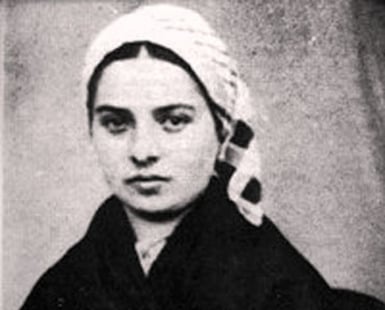 My wife Marilyn and I were blessed recently to go on a pilgrimage to Portugal, Spain and France. The trip included visits to Fatima and Lourdes, the sites of Marian apparitions. In 1858, in Lourdes France, the Blessed Virgin Mary appeared to 14-year-old Bernadette Soubirous. Our Lady of Lourdes revealed herself as “the Immaculate Conception” and directed Bernadette to an underground spring. The spring’s water is believed to have healing properties, and Lourdes has become a major pilgrimage site visited by millions each year. Then in 1917, in Fatima, Portugal, the Virgin Mother appeared over a period of six months to three shepherd children and identified herself as “Our Lady of the Rosary.” Our Lady urged the children to pray for the conversion of sinners. The apparitions culminated in the “Miracle of the Sun” on October 13, 1917, witnessed by tens of thousands. Today, millions of pilgrims gather each year in Fatima.Read More
My wife Marilyn and I were blessed recently to go on a pilgrimage to Portugal, Spain and France. The trip included visits to Fatima and Lourdes, the sites of Marian apparitions. In 1858, in Lourdes France, the Blessed Virgin Mary appeared to 14-year-old Bernadette Soubirous. Our Lady of Lourdes revealed herself as “the Immaculate Conception” and directed Bernadette to an underground spring. The spring’s water is believed to have healing properties, and Lourdes has become a major pilgrimage site visited by millions each year. Then in 1917, in Fatima, Portugal, the Virgin Mother appeared over a period of six months to three shepherd children and identified herself as “Our Lady of the Rosary.” Our Lady urged the children to pray for the conversion of sinners. The apparitions culminated in the “Miracle of the Sun” on October 13, 1917, witnessed by tens of thousands. Today, millions of pilgrims gather each year in Fatima.Read More -
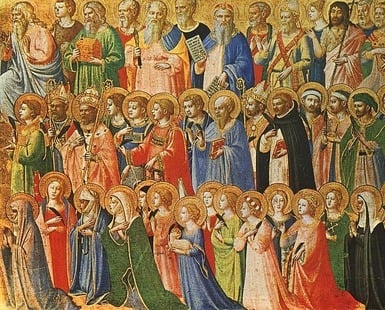 This weekend’s celebration of All Saints Day (Saturday) and All Souls Day (Sunday) invite us to reaffirm our faith in the first and last line of the Nicene Creed: “I believe in one God, the Father almighty, maker of heaven and earth, of all things visible and invisible… and I look forward to the resurrection of the dead and the life of the world to come.”Read More
This weekend’s celebration of All Saints Day (Saturday) and All Souls Day (Sunday) invite us to reaffirm our faith in the first and last line of the Nicene Creed: “I believe in one God, the Father almighty, maker of heaven and earth, of all things visible and invisible… and I look forward to the resurrection of the dead and the life of the world to come.”Read More -
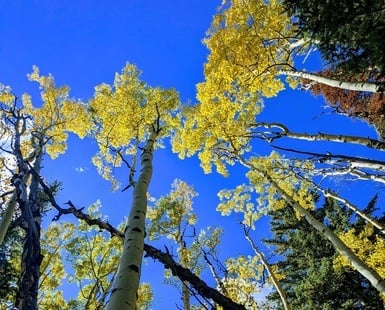 Shortly afterwards the branches stop sending fluid to the leaves which then separate and fall to the ground. Every year the Lord invites me to reflect upon this process: How wondrous it is that the leaves appear to be most beautiful just as their season is ending and they are about to die.Read More
Shortly afterwards the branches stop sending fluid to the leaves which then separate and fall to the ground. Every year the Lord invites me to reflect upon this process: How wondrous it is that the leaves appear to be most beautiful just as their season is ending and they are about to die.Read More -
 Have you seen those robotic vacuum cleaners, or lawn mowers, that wander around a room or a yard doing their job until they bump into something? Then they stop, back up, redirect, and continue on a new trajectory. That is exactly what Jesus does NOT want us to do in prayer. In this Sunday’s gospel passage (Luke 18: 1-8) Jesus tells a parable about the necessity “to pray always without becoming weary.”Read More
Have you seen those robotic vacuum cleaners, or lawn mowers, that wander around a room or a yard doing their job until they bump into something? Then they stop, back up, redirect, and continue on a new trajectory. That is exactly what Jesus does NOT want us to do in prayer. In this Sunday’s gospel passage (Luke 18: 1-8) Jesus tells a parable about the necessity “to pray always without becoming weary.”Read More -
 Our readings for the 28th Sunday in Ordinary Time give us advice on how we should live our lives as Christians. First we should remember to be thankful to our God and to others for what they do for us. Secondly, we need to love all our neighbors and accept them as children of God. We have heard this advice before, but we see in the Scripture readings where the Word turns into action.Read More
Our readings for the 28th Sunday in Ordinary Time give us advice on how we should live our lives as Christians. First we should remember to be thankful to our God and to others for what they do for us. Secondly, we need to love all our neighbors and accept them as children of God. We have heard this advice before, but we see in the Scripture readings where the Word turns into action.Read More -
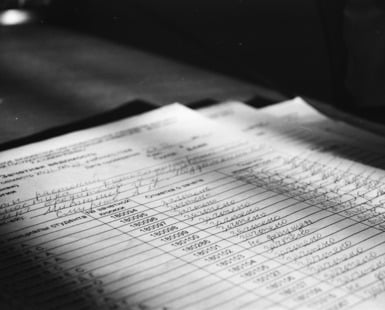 The four Catholic bishops of Colorado are asking all Catholics of our state to support three new ballot initiatives. They are encouraging all parishes to collect signatures to get these initiatives on the ballot for November 2026. Here is a brief description of the initiatives:Read More
The four Catholic bishops of Colorado are asking all Catholics of our state to support three new ballot initiatives. They are encouraging all parishes to collect signatures to get these initiatives on the ballot for November 2026. Here is a brief description of the initiatives:Read More -
 As we change seasons and the beauty of creation shines forth with the new colors of the leaves, many of us enter into a season of comfort and coziness. Sweaters come out (but the sandals may stay on here in Colorado), pumpkin-spiced beverages are everywhere, and we settle into a routine of football weekends (even if they come with painful, last-minute field goals). But with this weekend’s first reading, we are not shown comfort or coziness; rather, we are reminded that we must not become complacent. How should we act if we are to avoid becoming complacent?Read More
As we change seasons and the beauty of creation shines forth with the new colors of the leaves, many of us enter into a season of comfort and coziness. Sweaters come out (but the sandals may stay on here in Colorado), pumpkin-spiced beverages are everywhere, and we settle into a routine of football weekends (even if they come with painful, last-minute field goals). But with this weekend’s first reading, we are not shown comfort or coziness; rather, we are reminded that we must not become complacent. How should we act if we are to avoid becoming complacent?Read More -
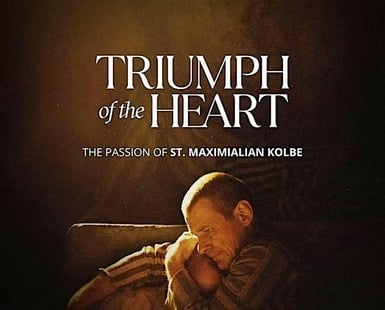 I am grieving. I did not know anyone who was injured in the school shootings of Minneapolis and Evergreen, nor did I know of Charlie Kirk before I heard of his assassination. I do not know anyone who has been injured or killed in Ukraine or Gaza or any other war-torn area of our world. I did not know any of the children who drowned in the Guadalupe River flood, or the floods in Pakistan, or the typhoons in the Philippines. So I am not grieving from the loss of a personal relationship. Nevertheless, I feel somewhat sad, tired and overwhelmed by all this bad news about which I feel powerless.Read More
I am grieving. I did not know anyone who was injured in the school shootings of Minneapolis and Evergreen, nor did I know of Charlie Kirk before I heard of his assassination. I do not know anyone who has been injured or killed in Ukraine or Gaza or any other war-torn area of our world. I did not know any of the children who drowned in the Guadalupe River flood, or the floods in Pakistan, or the typhoons in the Philippines. So I am not grieving from the loss of a personal relationship. Nevertheless, I feel somewhat sad, tired and overwhelmed by all this bad news about which I feel powerless.Read More -
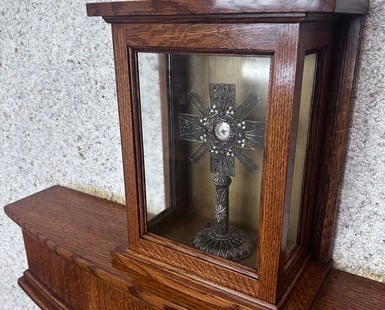 In the parish’s Our Lady of Sorrows Adoration Chapel, you will find peace and solitude when spending time with our Lord as he rests in the monstrance. But what you may not realize is that a first-class relic of the instrument used to crucify Him is nearby. A relic of the True Cross was bequeathed by an IHM parishioner about 15 years ago. It now sits in a reliquary in a glass box to the right of the monstrance, a reminder of the victory over sin and death.Read More
In the parish’s Our Lady of Sorrows Adoration Chapel, you will find peace and solitude when spending time with our Lord as he rests in the monstrance. But what you may not realize is that a first-class relic of the instrument used to crucify Him is nearby. A relic of the True Cross was bequeathed by an IHM parishioner about 15 years ago. It now sits in a reliquary in a glass box to the right of the monstrance, a reminder of the victory over sin and death.Read More -
 Do you know someone who has known the counsel of the Lord and has been given wisdom from the Holy Spirit? I think Scott Elmer, the Chief Mission Officer for the Archdiocese of Denver, is one of those gifted people. And he’s coming to IHM to share his wisdom with us on the evening of September 15th. Scott is leading the archdiocese on a bold new path of evangelization to meet the challenges posed by our secular culture.Read More
Do you know someone who has known the counsel of the Lord and has been given wisdom from the Holy Spirit? I think Scott Elmer, the Chief Mission Officer for the Archdiocese of Denver, is one of those gifted people. And he’s coming to IHM to share his wisdom with us on the evening of September 15th. Scott is leading the archdiocese on a bold new path of evangelization to meet the challenges posed by our secular culture.Read More -
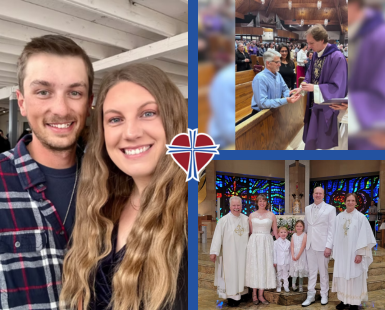 The Labor Day weekend signifies change. Temperatures thankfully start to cool off. The calendar changes from August to September. Traditional schools have begun or will soon begin their classes. But we learn something else might also be changing in the air.Read More
The Labor Day weekend signifies change. Temperatures thankfully start to cool off. The calendar changes from August to September. Traditional schools have begun or will soon begin their classes. But we learn something else might also be changing in the air.Read More -
 This weekend’s gospel tells of someone asking Jesus, “will only a few people be saved?” We might wonder what he means by “saved”. The Greek word which the gospels use for “saved” (sozo) refers to healing or deliverance in both a physical and spiritual way. It encompasses salvation from danger, sickness, death, evil spirits or sin. In the rest of the New Testament, it usually refers to spiritual salvation. In today’s passage Jesus does not answer the question of “how many;” rather, He focuses on the “how”. “Strive to enter through the narrow gate” (Luke 13: 24), he says, implying that to do so will take some effort on our part.Read More
This weekend’s gospel tells of someone asking Jesus, “will only a few people be saved?” We might wonder what he means by “saved”. The Greek word which the gospels use for “saved” (sozo) refers to healing or deliverance in both a physical and spiritual way. It encompasses salvation from danger, sickness, death, evil spirits or sin. In the rest of the New Testament, it usually refers to spiritual salvation. In today’s passage Jesus does not answer the question of “how many;” rather, He focuses on the “how”. “Strive to enter through the narrow gate” (Luke 13: 24), he says, implying that to do so will take some effort on our part.Read More -
 Currently there are at least three wildfires burning in Colorado covering about 127,000 acres (as of this writing on August 11). So it may seem like a puzzling time to reflect on the words of Jesus in this weekend’s Gospel: “I have come to set the earth on fire, and how I wish it were already blazing” (Luke 12:49). Does Jesus really want the whole earth to go up in flames? We need not take the Lord literally here. Fire is used throughout the Bible as a symbol of God’s mysterious dynamic presence; of God’s guidance and love; of God’s judgment on sinners; and of divine purification. While all these descriptions have their place in the mind of God and in salvation history, today I would turn our attention to another image of fire. The flame of the Baptismal candle is referred to as “the flame of faith” which must be kept burning brightly until the Lord returns. This last image best suits our purposes today as we reflect upon our Stewardship of Faith.Read More
Currently there are at least three wildfires burning in Colorado covering about 127,000 acres (as of this writing on August 11). So it may seem like a puzzling time to reflect on the words of Jesus in this weekend’s Gospel: “I have come to set the earth on fire, and how I wish it were already blazing” (Luke 12:49). Does Jesus really want the whole earth to go up in flames? We need not take the Lord literally here. Fire is used throughout the Bible as a symbol of God’s mysterious dynamic presence; of God’s guidance and love; of God’s judgment on sinners; and of divine purification. While all these descriptions have their place in the mind of God and in salvation history, today I would turn our attention to another image of fire. The flame of the Baptismal candle is referred to as “the flame of faith” which must be kept burning brightly until the Lord returns. This last image best suits our purposes today as we reflect upon our Stewardship of Faith.Read More -
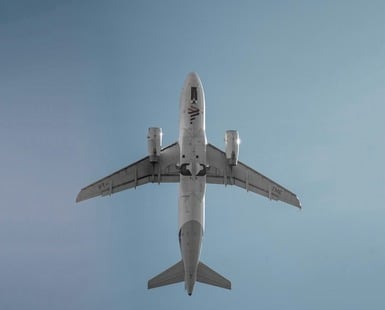 Whenever I fly on a plane, I’ll look into the cockpit on the way to my seat. No, I’m not hoping the pilot will invite me to take over the controls. I’ll want to get a glimpse of the person I’m putting my life into his or her hands. Because I have flown a lot, I have placed my trust in the pilots. I’m sure you have placed your trust in someone or something. Perhaps it is someone you trust with your life or how about when you’re driving and you put your trust in your vehicle to protect you from harm. I think you would agree trust is something that’s earned over time. Now another word for trust is faith. Faith is derived from the Latin word “fides” meaning confidence or trust in a person, thing or concept.Read More
Whenever I fly on a plane, I’ll look into the cockpit on the way to my seat. No, I’m not hoping the pilot will invite me to take over the controls. I’ll want to get a glimpse of the person I’m putting my life into his or her hands. Because I have flown a lot, I have placed my trust in the pilots. I’m sure you have placed your trust in someone or something. Perhaps it is someone you trust with your life or how about when you’re driving and you put your trust in your vehicle to protect you from harm. I think you would agree trust is something that’s earned over time. Now another word for trust is faith. Faith is derived from the Latin word “fides” meaning confidence or trust in a person, thing or concept.Read More -
 This weekend, Jesus, St. Paul, the Psalmist, and the writer of Ecclesiastes all call us to reevaluate whether we are focusing our efforts on the real goal, and the greater storyline, or if we are giving our lives to side quests. How much time, effort, and resources do we spend on our eternal relationship with God, as opposed to things that will be of no use to us when we die?Read More
This weekend, Jesus, St. Paul, the Psalmist, and the writer of Ecclesiastes all call us to reevaluate whether we are focusing our efforts on the real goal, and the greater storyline, or if we are giving our lives to side quests. How much time, effort, and resources do we spend on our eternal relationship with God, as opposed to things that will be of no use to us when we die?Read More -
 Today we hear in the Gospel reading Jesus teach his disciples how to pray through the Our Father. It is considered the perfect prayer, but have you ever considered praying it not just praying the words but slowing down and praying each word/phrase with intentionality allowing the words to bring your own heart closer to God and allowing them to teach us the way we ought to pray. The following is a brief prayerful reflection on each word/phrase in the Our Father, but I would encourage you to go deeper in reflecting on these words by reading the Catechism’s (2759-2865) breakdown of this important prayer.Read More
Today we hear in the Gospel reading Jesus teach his disciples how to pray through the Our Father. It is considered the perfect prayer, but have you ever considered praying it not just praying the words but slowing down and praying each word/phrase with intentionality allowing the words to bring your own heart closer to God and allowing them to teach us the way we ought to pray. The following is a brief prayerful reflection on each word/phrase in the Our Father, but I would encourage you to go deeper in reflecting on these words by reading the Catechism’s (2759-2865) breakdown of this important prayer.Read More -
 Whenever another driver zoomed by my father on the road, only to stop at the red light ahead of us, Dad would say, “Yeah buddy, hurry up and wait.” His voice often echoes in my head when impatient drivers cut me off. But when we consider our lives as a whole, there are times to hurry up and there are times to wait. Wisdom helps us decide when each is appropriate. And both of them are on clear display in today’s readings.Read More
Whenever another driver zoomed by my father on the road, only to stop at the red light ahead of us, Dad would say, “Yeah buddy, hurry up and wait.” His voice often echoes in my head when impatient drivers cut me off. But when we consider our lives as a whole, there are times to hurry up and there are times to wait. Wisdom helps us decide when each is appropriate. And both of them are on clear display in today’s readings.Read More -
 If you looked up the word neighbor in the dictionary, the first definition is obvious: a neighbor is one who lives near another. It could be your next-door neighbor. But I really liked the next two definitions of a neighbor: one is a neighbor who is a fellow human being, and the other definition is one who shows kindness and helps another person who is in need.Read More
If you looked up the word neighbor in the dictionary, the first definition is obvious: a neighbor is one who lives near another. It could be your next-door neighbor. But I really liked the next two definitions of a neighbor: one is a neighbor who is a fellow human being, and the other definition is one who shows kindness and helps another person who is in need.Read More -
 St. John Paul II spoke these words in a homily while visiting the United States in 1995, and they always come to mind every July 4th for me. We live in a world that tells us to do whatever you want: “You do you!” But that is not what we truly celebrate every year on July 4th; that is not what the Founding Fathers did when they signed the Declaration of Independence. They signed it out of a sense doing what they ought to do for the sake of the people of the 13 colonies. But we can take these words of JPII to a deeper level if we desire to be disciples of Jesus. We all struggle to do what we ought to instead of just doing what we want, but I would argue that despite how difficult that can be at times, it is the bare minimum of what we are called to do as disciples. And if we only remain at that base level, we are missing out on what it means to be a disciple of Jesus and a Catholic.Read More
See More
St. John Paul II spoke these words in a homily while visiting the United States in 1995, and they always come to mind every July 4th for me. We live in a world that tells us to do whatever you want: “You do you!” But that is not what we truly celebrate every year on July 4th; that is not what the Founding Fathers did when they signed the Declaration of Independence. They signed it out of a sense doing what they ought to do for the sake of the people of the 13 colonies. But we can take these words of JPII to a deeper level if we desire to be disciples of Jesus. We all struggle to do what we ought to instead of just doing what we want, but I would argue that despite how difficult that can be at times, it is the bare minimum of what we are called to do as disciples. And if we only remain at that base level, we are missing out on what it means to be a disciple of Jesus and a Catholic.Read More
See More
